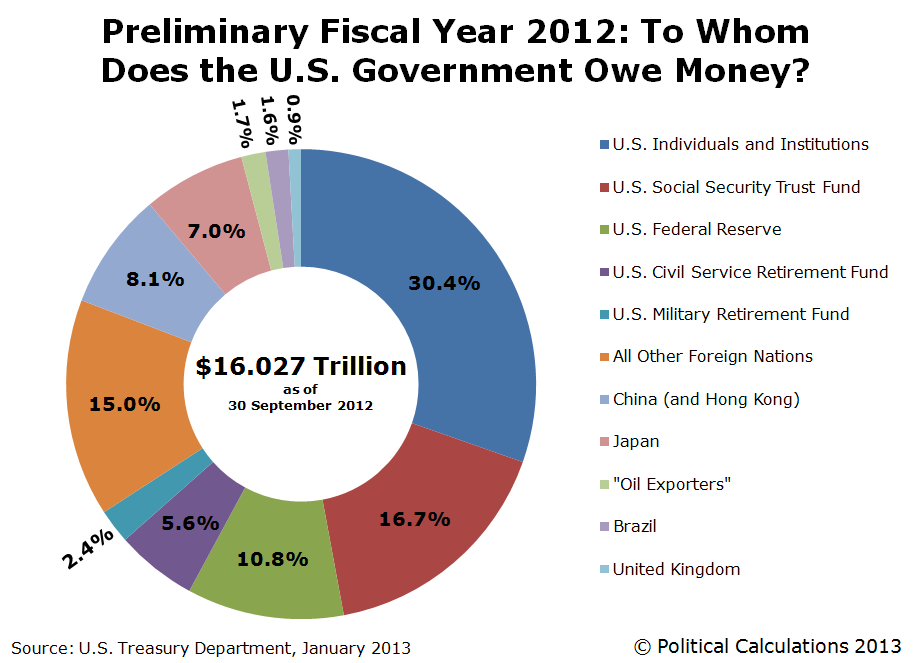Today, we're taking a preliminary look at just who owns all the debt issued by the U.S. federal government through 30 September 2012 - the end of the U.S. government's fiscal year. Our chart below visualizes what we found.
The information presented in our chart above is preliminary, as the U.S. Treasury typically revises its foreign entity debt ownership data in March of each year.
Overall, U.S. entities own just 65.8% of all debt issued by the U.S. federal government. Ranking the major U.S. entities from low to high, we find that:
- The U.S. government's military retirement fund owns 2.4% of the national debt.
- The U.S. government's civilian employee retirement fund accounts for another 5.6% of the nation's debt.
- The U.S. Federal Reserve, thanks to its quantitative easing programs of recent years, has racked up holdings equal to 10.8% of the total U.S. national debt.
- The U.S. Social Security Trust Fund claims 16.7%.
- U.S. individuals and institutions, which includes regular Americans, banks, insurance companies and other government entities, own 30.4% of the nation's debt.

Meanwhile, foreign entities own 34.2% of all U.S. government-issued debt, with the following nations' individuals and institutions representing the five biggest holders of that debt, again ranked from low to high:
- United Kingdom: 0.9%
- Brazil: 1.6%
- "Oil Exporters", which includes Ecuador, Venezuela, Indonesia, Bahrain, Iran, Iraq, Kuwait,Oman, Qatar, Saudi Arabia, Algeria, Gabon, Libya, Nigeria and the United Arab Emirates: 1.7%
- Japan: 7.0%
- China (including Hong Kong): 8.1%
All other nations hold approximately 15% of the U.S. outstanding national debt.
The Role of Quantitative Easing in Offsetting Foreign Ownership of the U.S. National Debt
The Federal Reserve's various quantitative easing programs of recent years, where the U.S. government-chartered central bank has purchased large quantities of U.S. government-issued debt in its attempts to keep the U.S. government's spending elevated and the U.S. economy stimulated by lowering long-term interest rates, are especially interesting in the degree to which they've succeeded in offsetting the share of the U.S. national debt owned by foreign interests.
Here, the Fed boosted its holdings of U.S. Treasury securities from a low of $474 billion on 18 March 2009 when it launched QE 1.0 to a peak of $1.684 trillion on 21 December 2011, which fell back to $1.676 trillion by 26 September 2012 - just before the end of the U.S. government's 2012 fiscal year.
The Fed also boosted its holdings of other federal agency debt securities from $48 billion on 18 March 2009 to a peak value of $169 billion on 10 March 2010, which has slowly declined to $83 billion as of 26 September 2012. All told, the Federal Reserve held an additional $1.21 trillion of the U.S. national debt compared to what it did before it began its quantitative easing programs.
As a result, the U.S. Federal Reserve has gone from holding 4.7% of all U.S. government-issued debt as of 18 March 2009 to holding 10.8% of it as of the end of the U.S. government's Fiscal Year 2012. During the peak of the program, the Federal Reserve crowded out almost every other purchaser of U.S. government-issued debt.
Assuming that other U.S. entities would have been unable to accumulate more of the U.S. national debt than they did during this period and that the U.S. government would have spent as much money as it did, if not for the Federal Reserve's quantitative easing programs, the share of the U.S. national debt held by foreign entities would have increased to 41.7%, with the bulk of the foreign acquisitions going to China.
As it stands, a little over 1 out of every 3 dollars borrowed by the U.S. federal government is now owned by foreign interests.
Data Sources
U.S. Federal Reserve. U.S. Treasury securities held by the Federal Reserve: All Maturities. Accessed 14 January 2013.
U.S. Federal Reserve. Federal agency debt securities held by the Federal Reserve: All Maturities. Accessed 14 January 2013.
U.S. Treasury. Major Foreign Holders of Treasury Securities. Accessed 14 January 2013.